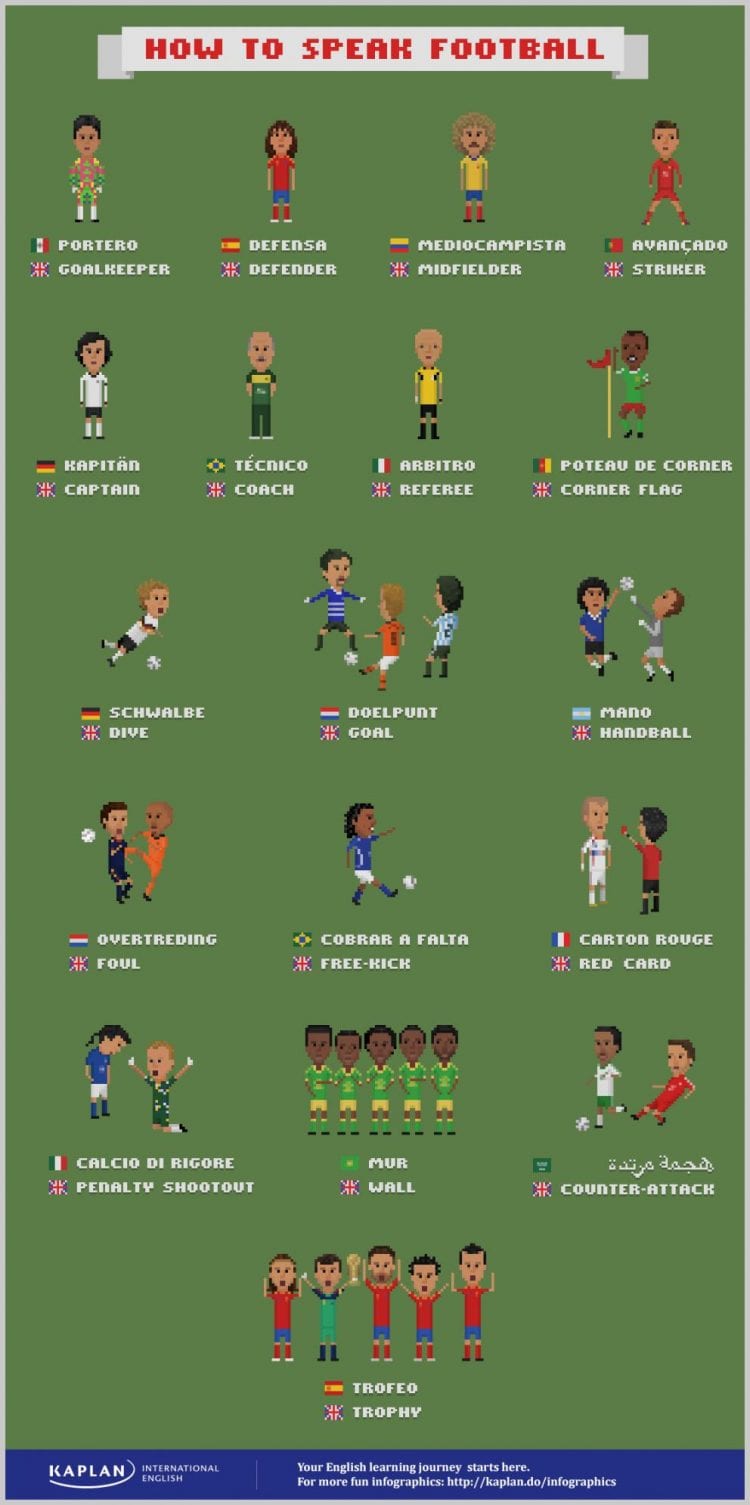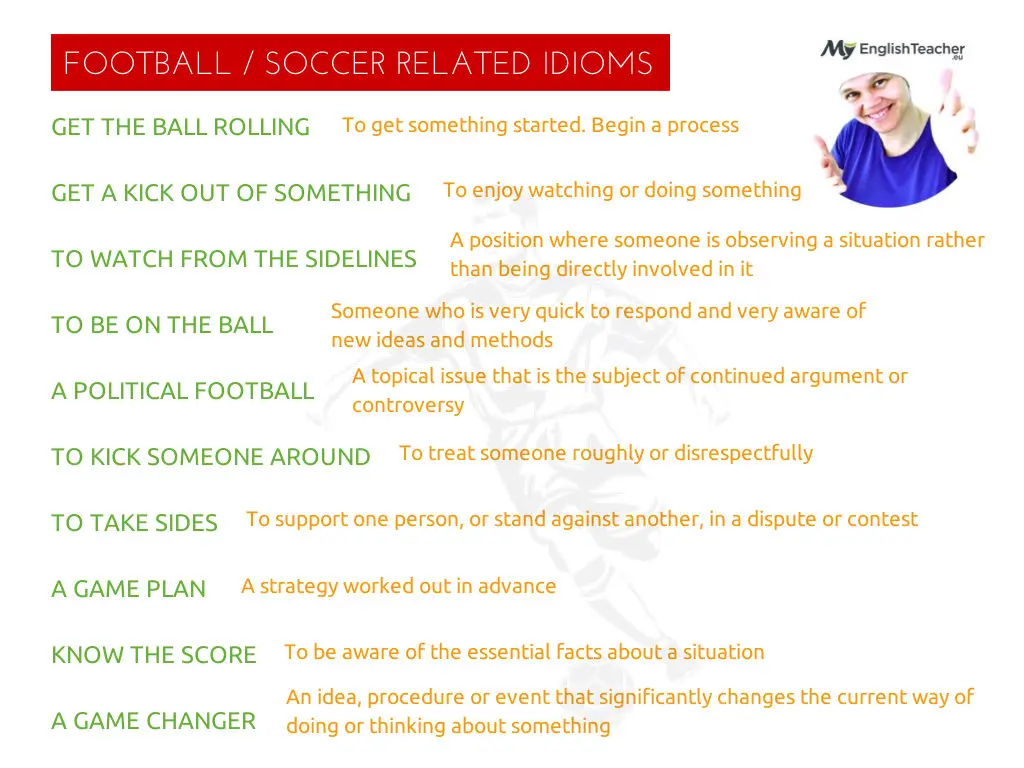
65 Football Phrases for Winning
SOCCER VOCABULARY
match: two teams playing against each other in a 90-minute game.
pitch: the area of a field where footballers play a match.
goalposts: markers used to determine where it would count as a goal.
penalty area: rectangular area marked out in front of each goal, outside of which the goalkeeper cannot handle the ball.
a draw, a tie, an equaliser: an even score at the conclusion of a game or match
extra time: a further period of play added on to a game if the scores are equal, and a draw is not an option i.e. in the final match of a tournament.
half-time: the time at which half of a game is completed, especially when marked by an interval.
full time: after the allocated time for a match has passed and the referee has blown the final whistle.
penalty shootout: a method of determining a winner in a match that would have otherwise tied or drawn. Thirty minutes extra time is usually played before it gets to this stage.
penalty kick, free kick: a free kick at the goal from the penalty spot (which only the goalkeeper is allowed to defend), awarded to the attacking team after a foul within the penalty area by an opponent.
goalkeeper, goalie: a player whose special role is to stop the ball from entering the goal.
striker, attacker, forward: a player who is considered in terms of ability to strike the ball into the goal area.
midfielder: a player who is positioned to play in the middle part of the playing field / pitch.
defender: a player whose task it is to protect their own side’s goal, and prevent the other team from scoring.
captain, skipper: the leader of a team.
substitute: a sports player nominated as eligible to replace another after a match has begun.
referee: an official who watches a match closely to ensure the rules are adhered to, and to arbitrate on matters that may arise during a game.
linesman, assistant referee: an official who assists the referee or umpire from the touchline, especially in deciding whether the ball is out of play or not, or if a player is offside.
foul: an unfair or invalid action, especially one involving interference with an opponent. A violation of the rules.
penalty: a punishment or disadvantage imposed on a player for infringement of the rules.
touchline, by-line, sideline: the boundary line on each side of the field, within which, the ball must remain during a game.
goal, net: a pair of posts linked by a crossbar and typically with a net, forming a space into which the ball has to be sent in order to score.
a booking: a yellow card shown to a player for a serious foul. Two yellow cards result in a red card, which means the player gets sent off (unable to continue playing).
injury time, stoppage time: added minutes at the end of the regular playing time, to account for any time out of play during the match. Entirely at the referee’s discretion.
score: the record of goals that indicates who is winning. The final score indicates who has won the match.
offside: a position which is not allowed by the rules of the game – when a striker is closer to the opposing team’s goal area than the last defender, when the ball is passed to him/her.
goal: A successful attempt at scoring achieved at the instance of sending the ball into the goal of the opposing team.
own goal: a goal scored accidentally by a member of the defending team that counts in favour of the attacking team.
kick-off: the first kick of the game when two players from the same team in the centre circle play the ball and start the game.
to shoot: to kick the ball towards the net in an attempt to score a goal.
a corner: a kick from the corner flag awarded to the attacking team when the ball has passed the by-line after last being touched by a player from the defending team.
a throw in: a throw is taken from the sideline after the ball has gone out of play. This is the only time a player can handle the ball without committing a foul.
a header: a shot that occurs when a player touches and guides the ball with his or her head.
a hat-trick: when one player scores three goals in one game.
national anthem: an uplifting or rousing song that identifies a nation. Usually sung at the start of an important match for each country.
If you’re talking to your friends about football, you might hear them using some of these phrases. Here are their explanations so you can understand and respond accordingly!
More for you:
70 Remarkable Sports Idioms You Can Use In Business And Daily Life
Formal and Informal Email Phrases Starting with Greetings

FOOTBALL EXPRESSIONS
Back of the net! to score a goal
- You should’ve seen it, it was such a great goal. Back of the net!
Man on! this is usually shouted out during a match to warn someone that a player of the other team is right behind them. Often a call to pass the ball.
- Quick! Man on! Pass the ball to Jones!
We were robbed: a phrase used to express that a defeat was unjust, possibly due to an injustice committed by somebody else.
- The referee didn’t see that foul. If he’d given that player a yellow card he wouldn’t have scored that goal. We were robbed!
He’s (she’s) got a sweet left foot: referring to a player who is very skillful at kicking the ball with his / her left foot (most players use the right foot)
- She’s one of the best players on the team, and she’s got a sweet left foot.

He (she) pulled off a great save, what a save! referring to a very quick, acrobatic stop of a shot by the goalkeeper.
- What a save by the goalie. That was fantastic!
Hit the woodwork: when a player intends to shoot into the goal but hits the crossbar or the post of the goal instead, and was very unlucky not to have scored.
- He almost had it, but unfortunately it hit the woodwork.
They got stuck in: referring to a team whose players showed a lot of determination to succeed.
- They got stuck in right from kick-off and truly deserved to win.
Ran the defence ragged: referring to an attacking player who made the defenders from the opposing team look uncomfortable or incompetent.
- He deserves to be Man of the Match. He scored a hat-trick and ran the defence ragged!
- Jones is definitely a great player, he’s got a lot of pace.
The goalkeeper made a howler: used when the goalkeeper makes a very basic mistake (and probably lets the other team score a goal).
- They were in the lead, but then the goalkeeper made a howler and the other team scored.
It’s a game of two halves: an expression referring to the fact that a football match can change unexpectedly throughout the 90 minutes. Especially between the first half and second half of the match.
- Well, they may be losing now, but it’s a game of two halves!
More for you:
10 Business English Phrases About Sport You Can Use in Daily Business Communication
39 Sports Games You Should Really Know in English
FOOTBALL-RELATED IDIOMS
Idioms are different from the above expressions because they can be used in conversation about any topic and not just football. Even people who do not follow football enthusiastically use these idioms in everyday speech, like me!
Get the ball rolling: to get something started. Begin a process.
- We need to have everything ready for the party by next week, so if you could please get the ball rolling by inviting everyone, that would be really helpful.
Get a kick out of something: to enjoy watching or doing something.
- If you get a kick out of horror movies, then you’ll love the new Quentin Tarantino film!
To kick something off, to kick-start something: to begin or cause something to begin.
- We’re going to kick-start the summer with a lovely weekend trip to the countryside.
To keep one’s eye on (or take one’s eye off) the ball: to keep (or fail to keep) your attention focused on the matter at hand.
- If you want to be a successful businessman, you need to keep your eye on the ball all the time.
- He took his eye off the ball when he shouldn’t have done, and the rival company managed to snatch the deal from him.
To watch from the sidelines: a position where someone is observing a situation rather than being directly involved in it.
- You never supported me when I needed you. You just watched from the sidelines!
To move the goalposts: to unfairly change the rules or conditions of a procedure during its course.
- Jessica quit her job because her boss kept moving the goalposts about her promotion prospects.
- What’s wrong with you? You used to be on the ball with your work all the time.
A political football: a topical issue that is the subject of continued argument or controversy.
- Retirement age is a big political football in the European Union’
At this (late) stage in the game: this simply means ‘at this point’.
- There’s nothing we can do at this stage in the game. You should’ve told me earlier.
To kick someone around: to treat someone roughly or disrespectfully.
- I don’t think it’s fair the way you kick him around all the time. He deserves some respect.
To score an own goal: an act that unintentionally harms one’s own interests.
- Unfortunately, Sarah scored an own goal by quitting her job before signing her new contract.
To take sides: to support one person, or stand against another, in a dispute or contest.
- I’m not taking sides. I think you’re both wrong, so I’m not getting involved!
League: a class or category of quality or excellence.
- When it comes to achieving perfection, John is in a league of his own.
To blow the whistle on someone: to bring an illicit activity to an end by informing on the person responsible.
- She was offered a lot of money as a bribe, because she threatened to blow the whistle on the company’s illegal activities.
A game plan: a strategy worked out in advance
- We need to come up with a better game plan; this idea will never work!
Know the score: to be aware of the essential facts about a situation.
- I don’t need to explain anything else to my boss, he knows the score.
A game changer: an idea, procedure or event that significantly changes the current way of doing or thinking about something.
- The new software had become known as the new ‘game-changing’ entertainment experience.
A Adjectives B Business English C D dictionary E English grammar English Idioms English language English Learning Tips English phrases English teacher English Vocabulary English Vocabulary English words F G H how to learn english I idioms Infographic J L Learn English M N noun O P phrasal verb R S Skype T teach English Teaching English as a foreign language Text Abbreviations The Jungle Book tips U W Y
- Abbreviations
- acronyms
- Advanced English Lesson
- Adverbs
- Apps
- Arabic
- Articles
- Beginner English
- Books
- Business English
- Clauses
- Collocations
- Conjunctions
- Difference Between
- English Grammar
- English Idioms
- English Learning Tips
- English Questions and Answers
- English Speaking
- English Test
- English Videos
- English Vocabulary
- English Vocabulary Dictionary
- English Writing
- For Kids
- For Teachers
- French
- Games
- German
- Hindi
- Hungarian
- IELTS
- Infographics
- Intermediate English
- Italian
- Japanese
- Learn English
- Listening Skills
- Lyrics
- Names
- Phrasal Verbs
- Portuguese
- Prefix
- Prepositions
- Proverbs
- Q&A
- Quiz
- Quotes
- Russian
- Should
- Spanish
- Suffix
- Synonyms
- Teach English
- Technology
- Uncategorized
- Understanding
- Useful English learning websites
- Vietnamese

























Very interesting site, specially for us the foreigners.